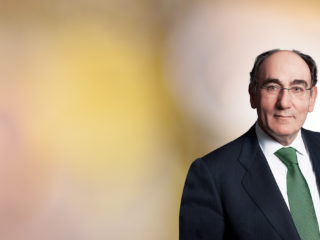
Despite the latest Eurobarometer results which reveal that more than two thirds of EU member inhabitants (68%) are convinced that their country has benefited from EU membership, the optimism of these figures cannot allow us to forget that 50% consider that the EU is not going in the right direction, writes Ignacio S. Galán, Chairman and CEO of Iberdrola, a Spanish public multinational electric utility company. “The ambivalence reflected in these results is a wake-up call regarding the crucial importance for the future of the EU of next May’s European Parliament elections.” Galán’s article is part of the article series “Europe can do better. How our continent finds new strange. A wake-up call from economy” which was initiated by Handelsblatt and United Europe.
The scale of the challenges facing the European Union today is unprecedented in the more than sixty years since the signing of the Treaty of Rome in 1957. The nature of some of these challenges is global, such as climate change, international trade tensions, the impact of automation and the digital revolution and the rise of unilateralism. Others, however, concern the Community area itself, such as those related with Brexit, the management of phenomena such as refugees and migration in Europe and the search for a consensus in order to deliver on the agenda of pending reforms.
The combined effect of these challenges – which have different, but closely interlinked origins and development – requires a new joint effort so that the EU can adopt common solutions from a stronger position.
Despite the impact of those who question the value of the European Union, the latest Eurobarometer results reveal that more than two thirds of those surveyed (68%) are convinced that their country has benefited from EU membership. This is the highest percentage since 1983, demonstrating the validity of the most successful political and economic integration schemes of all time. However, the optimism of these figures cannot allow us to forget that 50% consider that the EU is not going in the right direction.
The ambivalence reflected in these results is a wake-up call regarding the crucial importance for the future of the EU of next May’s European Parliament elections. Renewing the public’s confidence in the European project means that much more effort is needed to convey to them the European Union’s enormous achievements, but, above all, it provides an exciting opportunity to show that a stronger and more united Europe is the only scenario that can provide its 500 million citizens with a vision of prosperity, security and well-being, under shared democratic values.
However, this responsibility cannot fall exclusively on the Community institutions. Within each country and each sector, public authorities, political parties, civil society organisations and businesses all have a role to play. They are aware that Europe can and must improve and, despite their differences on specific policies, , they have the responsibility to defend and explain that by remaining united around common values we will be better able to meet the challenges of an ever-changing global world.
From my viewpoint as chairman of Iberdrola, a leader in renewable energy that is deeply committed to the development of a sustainable energy model, I would like to commend the global leadership that the European Union has shown in the fight against climate change, the main threat facing the international community. Great efforts have been made to hasten the energy transition to a decarbonised economy based on electrification and the development of renewable energy sources.
Through the “Clean Energy for all Europeans Package”, promoted by the Commissioner for Climate and Energy Action, Miguel Arias Cañete, the European Parliament, the Commission and the European Council have agreed on a global framework that sets new targets to be achieved by 2030 for renewable energy, emissions reductions and improved energy efficiency, in order to remain at the forefront of global climate action.
Similarly, the European Union is the only large economy to have a roadmap for 2050, and it is currently involved in drawing up a long-term strategy that will make it possible to achieve a net zero emissions balance for the economy as a whole by that date. The European Commission is going to open up an inclusive debate on this strategy which, in addition to the Member States’ institutions and parliaments, will include companies, NGOs, cities, communities and the public: a way to encourage the involvement of all the players in defining the objectives that affect them equally.
The implementation of this strategy is also a powerful lever for growth and the creation of stable, quality jobs and a driving force for transforming the production model in sectors such as energy, construction, transport and agriculture. According to figures published by the European Commission, the implementation of this climate-neutral strategy could mobilise, in the energy sector alone, investments that would increase Europe’s GDP by up to 2.8%, compared to the current 2%. In other words, additional investments in the range of 175 to 290 billion euros a year.
Europe’s commitment to sustainable energy to meet the targets of the Paris Agreement will create the conditions for promoting investment, boosting economic activity, promoting job creation, encouraging innovation and opening up new business opportunities for companies, while at the same time reducing emissions and energy dependency on foreign countries.
In its vision for the future of Europe, the European Round Table of Industrialists (ERT), of which I am a member, actively defends the need for Europe to work and remain united to achieve inclusive growth with the support of its citizens, today more than ever, this group brings together the leaders of large European companies in the industrial and technological sectors that employ nearly 7 million people and invest 51 billion euros annually in R&D+i.
Building on the successes of European integration, the ERT is committed to directing efforts towards improving the competitiveness of European industrial companies in order to increase the contribution of this sector to the economy as a whole. To this end, it promotes innovation and investment in research and development. It also advocates greater investment in education to boost job creation among young people. In addition, it considers it vital to make progress on digitisation and ensure an energy transition based on sustainable technologies to tackle climate change.
In order to achieve all of this, the European Union needs to continue to promote and adopt reforms that will allow it to deepen the Economic and Monetary Union, strengthen the Banking Union, complete the digital single market and the Energy Union.
Successfully overcoming all these challenges in a global world will be easier with the blueprint for political integration, cooperation and shared leadership that the European Union represents in a fragmented world, and by strengthening its leadership as a benchmark in the defence of democracy, freedom and tolerance. A united Europe is stronger and more valuable for the European states, for European citizens and for the world.
The article series “Europe can do better. How our continent finds new strength. A wake-up call from economy” appear in Handelsblatt in German and in German and Englisch on Handelsblatt Online and the website of United Europe until the European Elections. They are also collected in a book which was published on 15 April, 2019 by Herder-Verlag. Please find more information about the book in German here.
Ignacio S. Galán is Chairman and Managing Director of Iberdrola and Chairman of the subsidiaries of the Iberdrola Group. Since joining Iberdrola in 2001, he has made the energy company one of the five largest in the industry worldwide. Galán studied at the Faculty of Engineering (ICAI) of the Pontifical University of Comillas in Madrid and graduated as an Industrial Engineer. He is currently a visiting professor at Strathclyde University, Chairman of the Social Council of Salamanca University and patron of the University Foundation of the Faculty of Engineering of the Pontifical University of Comillas. Furthermore, Galán is a member of the Supervisory Board of the Institute of Technology (MIT). Ignacio Galán is also a member of the Electricity Working Group of the World Economic Forum in Davos, which he chaired in the past, and a member of the Steering Committee of the European Round Table of Industrialists (ERT).



